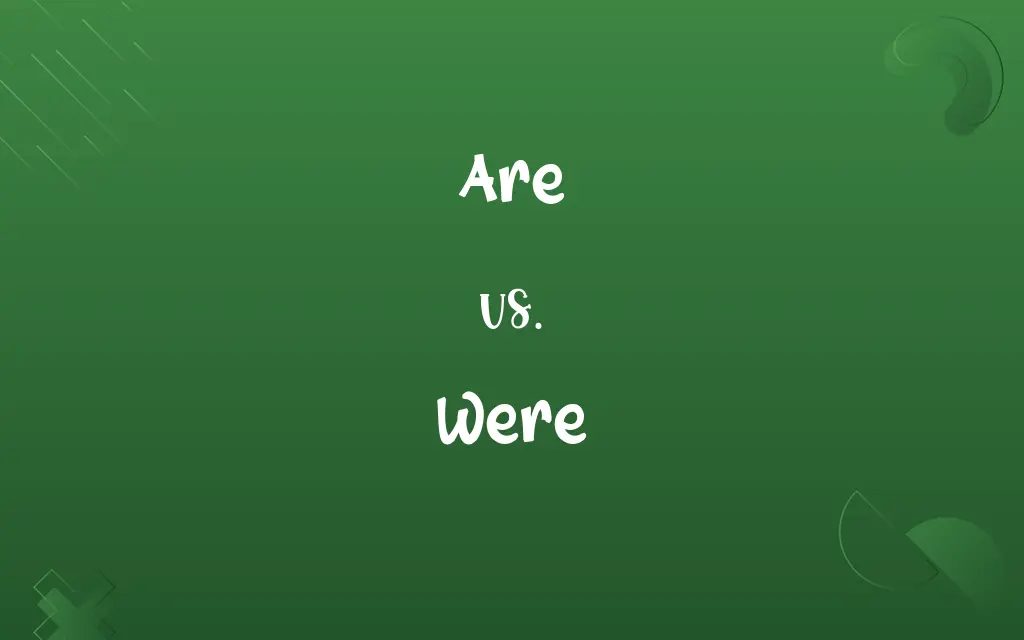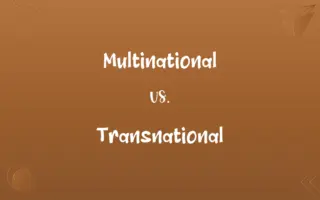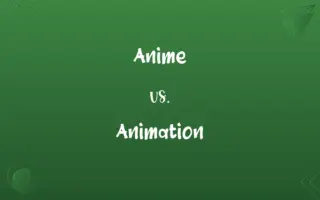Are vs. Were: Know the Difference

By Shumaila Saeed || Published on January 11, 2024
"Are" is the present tense plural form of "to be," used for current states or actions, while "were" is the past tense plural form, used for past states or actions.

Key Differences
"Are" is present tense, plural, indicating a current state or action. "Were" is past tense, plural, referring to a state or action in the past.
Shumaila Saeed
Jan 11, 2024
Sentences with "are" describe current conditions ("They are happy"), while "were" describes past conditions ("They were happy").
Shumaila Saeed
Jan 11, 2024
"Are" is used with plural subjects in the present tense. "Were" is used with plural subjects in the past tense, and with singular subjects in the subjunctive mood.
Shumaila Saeed
Jan 11, 2024
"Are" does not appear in the subjunctive mood. "Were" is used in the subjunctive for hypothetical or unreal situations ("If I were you...").
Shumaila Saeed
Jan 11, 2024
Both "are" and "were" are forms of the verb "to be," adapting to different tenses and subjects.
Shumaila Saeed
Jan 11, 2024
ADVERTISEMENT
Comparison Chart
Subject Agreement
Plural subjects
Plural subjects and singular in subjunctive mood
Shumaila Saeed
Jan 11, 2024
Example Usage
"They are going to the store."
"They were at the store yesterday."
Shumaila Saeed
Jan 11, 2024
ADVERTISEMENT
Are and Were Definitions
Are
Second person singular and plural and first and third person plural present indicative of be.
Shumaila Saeed
Dec 13, 2023
ADVERTISEMENT
Were
Second person singular and plural and first and third person plural past indicative of be.
Shumaila Saeed
Dec 13, 2023
Were
Inflection of be
We were about to leave.
Mary and John, you were right.
They were a fine group.
They were to be the best of friends from that day on.
Shumaila Saeed
Dec 13, 2023
Are
(rare) An accepted (but deprecated and rarely used) metric unit of area equal to 100 square metres, or a former unit of approximately the same extent. Symbol: a.
Shumaila Saeed
Dec 13, 2023
Were
Inflection of be
I wish that it were Sunday.
I wish that I were with you.
Shumaila Saeed
Dec 13, 2023
Are
The present indicative plural of the substantive verb to be; but etymologically a different word from be, or was. Am, art, are, and is, all come from the root as.
Shumaila Saeed
Dec 13, 2023
Were
(fandom) The collective name for any kind of person that changes into another form under certain conditions, including the werewolf.
Shumaila Saeed
Dec 13, 2023
Are
The unit of superficial measure, being a square of which each side is ten meters in length; 100 square meters, or about 119.6 square yards.
Shumaila Saeed
Dec 13, 2023
Were
A fine for slaying a man; the money value set upon a man's life; weregild.
Every man was valued at a certain sum, which was called his were.
Shumaila Saeed
Dec 13, 2023
Were
The imperfect indicative plural, and imperfect subjunctive singular and plural, of the verb be. See Be.
Shumaila Saeed
Dec 13, 2023
Repeatedly Asked Queries
Share this page
Link for your blog / website
HTML
Link to share via messenger
About Author
Written by
Shumaila SaeedShumaila Saeed, an expert content creator with 6 years of experience, specializes in distilling complex topics into easily digestible comparisons, shining a light on the nuances that both inform and educate readers with clarity and accuracy.









































































